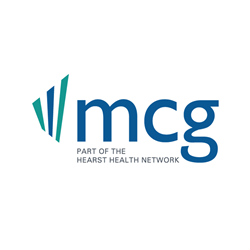
MCG is licensed by nearly 2,000 hospitals and nine of the largest U.S. health plans.
“MCG editors are the industry experts in evidence analysis, and once again, they’ve produced a robust volume of clinical knowledge that will inform care decisions for millions of people.” – Jon Shreve, President & CEO, MCG Health
SEATTLE, Wash. (PRWEB)
March 03, 2020
MCG Health, part of the Hearst Health network and a leading provider of informed care strategies, announces the release of its 24th edition of evidence-based care guidelines. Many new additions to MCG solutions were driven by the healthcare industry’s move to value-based care and include new and updated tools for payers and providers to better leverage available scientific evidence through MCG clinical content.
Since 1988, MCG has been reviewing the latest medical research and distilling this information into evidence-based, clinical guidelines and plans of care. To date, MCG physician and nurse editors have reviewed 161,999 scientific articles, incorporating a cumulative 46,694 unique citations into the MCG care guidelines. With the publication of the 24th edition alone, the unique citation count expanded by an impressive 6,995.
With the costs of neonatal intensive care estimated to be $26.2 billion per year in the United States[1], the placement of neonates in the proper level of care is among the most critical of decisions for clinicians. To support the identification of the appropriate NICU level, MCG has added new features to its Inpatient & Surgical Care volume to help guide decision-making and support required clinical documentation.
With the proliferation of new DNA sequencing technology, genetic testing has become more commonplace in the diagnosis and treatment of various conditions. However, identifying those genetic tests which exhibit clinical utility still proves to be a challenge for many organizations practicing patient-specific care. The 24th edition of Ambulatory Care helps address this issue with five new guidelines and also features new evidence in other high-cost areas such as diagnostic imaging, durable medical equipment, and specialty medications.
With mental health parity a rising concern for providers and payers, MCG Behavioral Health Care guidelines can help support compliance when used as part of a comprehensive clinical strategy. This content volume added several new guidelines to existing material that already provided robust, evidence-based support for opioid management and other substance use disorders.
For post-acute care, the 24th edition has enhanced content for our population health solutions (MCG Chronic Care and MCG Transitions of Care), as well as provided alignment with industry quality measures (MCG Recovery Facility Care) and updated level of care tools.
MCG has also updated its Indicia platform with a new option for reviewer statistics dashboards which can intuitively provide hospital leadership with specific insights on how employees are using MCG care guidelines in the clinical workflow.
MCG President and CEO, Jon Shreve, commented on the 24th edition by saying, “MCG editors are the industry experts in evidence analysis, and once again, they’ve produced a robust volume of clinical knowledge that will inform care decisions for millions of people. With the 24th edition, healthcare professionals will have MCG as an objective source of truth to support better patient outcomes while addressing on-going industry changes such as parity enforcement or CMS’ Patient-Driven Groupings Model.”
MCG care guidelines are unique among clinical decision support offerings as they are licensed by nine of the largest U.S. health plans and nearly 2,000 hospitals, making them a trusted, clinical language for both the payer and provider communities. MCG will once again be offering educational workshops at its annual Client Forum to train clinicians and case managers on updates in the new edition. For those clients who cannot attend the conference, MCG will offer special webinars via its online Learning Management System.
References:
1. Guat Sim Cheah, Irene. Economic assessment of neonatal intensive care. Transl Pediatr. 2019 Jul; 8(3): 246–256. Accessed at: https://www.ncbi.nlm.nih.gov/pmc/articles/PMC6675687/
About MCG Health
MCG, part of the Hearst Health network, helps healthcare organizations implement informed care strategies that proactively and efficiently move people toward health. MCG’s transparent assessment of the latest research and scholarly articles, along with our own data analysis, gives patients, providers, and payers the vetted information they need to feel confident in every care decision, in every moment. For more information visit http://www.mcg.com or follow our Twitter handle at @MCG_Health.
About Hearst Health
The mission of Hearst Health is to help guide the most important care moments by delivering vital information into the hands of everyone who touches a person’s health journey. Each year in the U.S., care guidance from Hearst Health reaches 85 percent of discharged patients, 205 million insured individuals, 99 million home health visits and 3.2 billion dispensed prescriptions. The Hearst Health network includes FDB (First Databank), Zynx Health, MCG, Homecare Homebase, MHK (formerly MedHOK—Medical House of Knowledge) and Hearst Health Ventures (http://www.hearsthealth.com). Hearst also holds a minority interest in the precision medicine and oncology analytics company M2Gen. Follow Hearst Health on Twitter @HearstHealth or LinkedIn @Hearst-Health.
Share article on social media or email:

